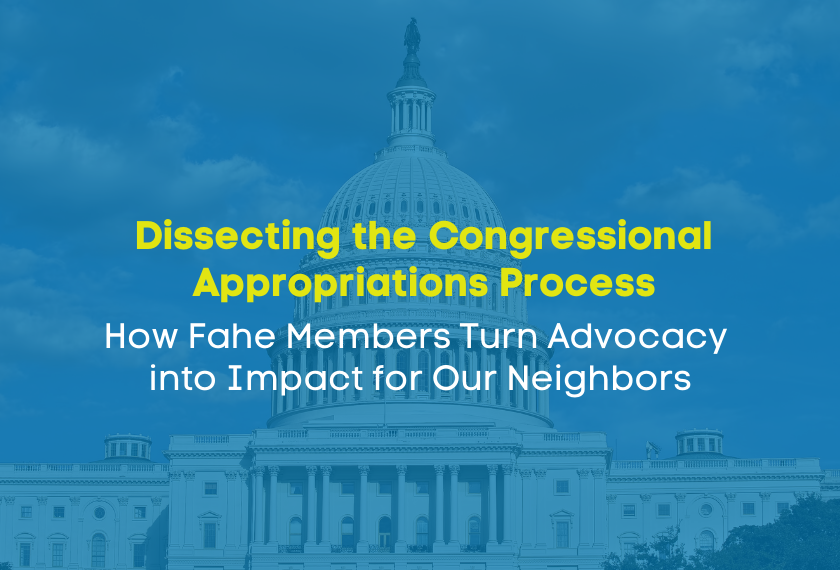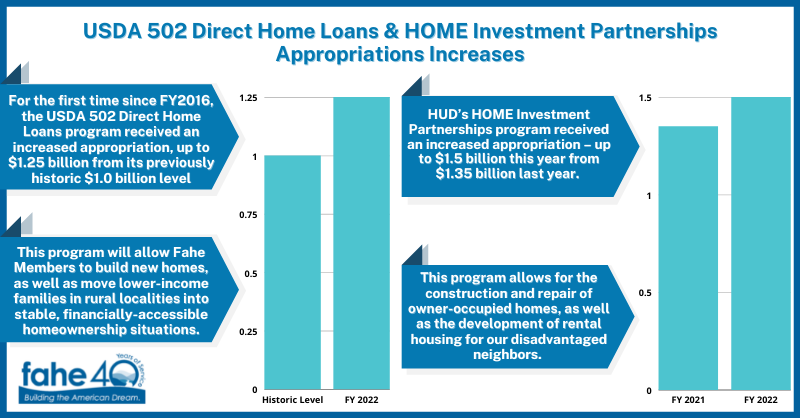
Dissecting the Congressional Appropriations Process
How Fahe Members Turn Advocacy into Impact for Our Neighbors
Fahe Members work every day to turn federal investments into stable homes, stronger communities, and better infrastructure for their neighbors. They often do so against long odds – facing large-scale unemployment, persistent poverty, declining populations, and structural disadvantages in public policy. In short, they are often torn between the day-to-day needs of serving their communities and the imperative of advocating for greater resources to meet local demand and policy reforms to remedy these systemic disadvantages.
Even while they uphold their mission-driven commitment to their communities, Fahe Members still make time for the equally important work of communicating the needs and opportunities they see around them to policymakers at the local, state, and federal levels. This advocacy has paid off repeatedly over the course of the more than forty-year history of Fahe. Fahe Members helped create the federal Community Development Financial Institution system and piloted a nonprofit loan packaging system for the USDA’s mortgage program. More recently, they worked to ensure that rural and persistently impoverished localities benefited equally from economic investments following the coronavirus pandemic.
Every year, the federal government sets new funding levels for a variety of housing, community and economic development, and infrastructure investments. And year after year, Fahe Members have been at the table, championing the needs of their communities to their congressional offices and underscoring the importance and the impact that those investments enable in their districts and states.
In March, Congress and the White House settled on the final funding levels for those investments for the current fiscal year, Fiscal Year 2022. Despite the failure of Congress to pass an historically large standalone investment package over the last year, the annual appropriations process offered a chance to make some long-overdue progress. In fact, the recent appropriations law contained several notable funding increases to crucial federal programs that Fahe Members deploy every day.
For instance, for the first time since FY2016, the USDA 502 Direct Home Loans program received an increased appropriation, up to $1.25 billion from its previously historic $1.0 billion level. This program will allow Fahe Members to build new homes, as well as move lower-income families in rural localities into stable, financially-accessible homeownership situations. Likewise, HUD’s HOME Investment Partnerships program received an increased appropriation – up to $1.5 billion this year from $1.35 billion last year. This program allows for the construction and repair of owner-occupied homes, as well as the development of rental housing for our disadvantaged neighbors.

While these two programs received notable increases to their funding levels, in general the FY2022 law still fell short of initial hopes. Following an encouraging start to the budget process in the Spring of 2021, which saw sizable proposed increases in most areas nearly across the board, Congress backed off of those increases as the year wore on. Many House and Senate members originally believed that the since-mothballed standalone Build Back Better investment package would supply much of the needed investment hikes. The end result, however, simply yielded a stalled standalone package and lower-than-anticipated appropriations levels that generally didn’t quite live up to policymakers’ initial aspirations.
Stubborn employment challenges from the pandemic, depleted resources in pandemic response programs, rising inflation, and ongoing disinvestment challenges have all conspired to dramatically increase communities’ needs for support and assistance services. These programs and services, like the ones spearheaded by the Fahe Network, require a funding commitment, and many of our underserved communities rely specifically on federal investments to support them.
This ascending community need, combined with programmatic resource limitations, is why it is so important that federal investment decisions for FY2023 benefit from the knowledge and lived experiences of on-the-ground experts like Fahe Members. In all, Fahe Members weighed in on twenty-six different federal programs in the FY2023 appropriations process.
In order to empower the collective voices of our Network, Fahe recently held a training session on tips, tutorials, and best practices for effective federal advocacy. The Fahe Network hails from a diverse background in its experiences with the federal policymaking process, and each Member brings unique perspectives to legislative debates around our public funding priorities. Fahe’s training session was designed to give some of the more congressionally-seasoned “old hands” the timeliest up-to-date information, as well as empower newer Members and first-time advocates to confidently carry their voices to Washington on behalf of their neighbors. Most importantly, like at any Fahe meeting, it provided the chance for peers across our six-state region to share their expertise with one another.
In addition to the general training in effective advocacy practices, Members were also interested to hear more about the ‘earmark’ process. With the recently-signed law covering FY2022 featuring the return of a renewed earmarks process, Members were eager to hear lessons learned and think about how they might help federal appropriators focus on our financially neediest communities through the current budgetary process.
As another year of public policy advocacy continues, Fahe Members continue to stand ready to engage with decision-makers at every level of government. They will share the urgent needs of their communities and relate to officeholders the transformative power we can jointly achieve together. They will share with their congressional representatives the possibilities of turning federal investments into tangible community assets like homes, broadband access, and jobs to uplift the daily realities of life for Americans. Most importantly, they will articulate a vision for how these investment decisions, in tandem with other important policy changes, can enable the American Dream for millions of their neighbors. The only question is, will Congress heed the call on behalf of their communities?
